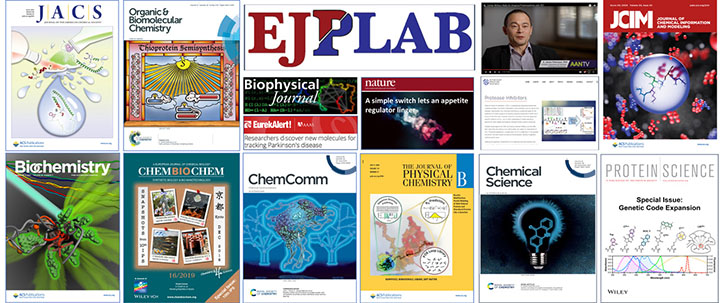Awards
• Searle Scholar (2010)
• Sloan Research Fellow (2012)
• NSF CAREER Award (2012)
• Award for Early Excellence in Physical Organic Chemistry (2013)
• Institute on Aging Fellow (2014)
• Thieme Chemistry Journal Award (2017)
• Jane Glick Award for Graduate Teaching (2018)
• Lindback Award for Distinguished Teaching (2023)
• A.B. Dartmouth College (1998)
• Ph.D. California Institute of Technology (2005)
• NIH Postdoctoral Fellow, Yale University (2005-2008)
Protein folding and protein interactions underlie both proper function and disease in biological systems. Many receptor proteins signal through complex interactions and rearrangements, and some proteins, such as the Parkinson’s Disease protein α-synuclein, misfold into toxic conformations. Studying these protein motions not only aids our understanding of diverse biological phenomena, it also contributes to an important fundamental problem in biochemistry: understanding how proteins fold and change shape. The Petersson laboratory is developing tools to address questions of how peptides and proteins mediate cellular communication and how the cellular environment catalyzes protein misfolding, from detailed in vitro folding studies to imaging in live animals. These tools include novel chromophores, which we synthesize and incorporate into proteins through unnatural amino acid mutagenesis and synthetic protein ligation. We apply these tools to several key disease areas through collaborations in the Perelman School of Medicine: preventing the acquisition of antibiotic resistance by bacteria, Parkinson’s Disease, and fluorescence-guided cancer surgery. In many cases, the balance between health and disease is governed by post-translational modifications, for which we study the enzymes that install them, both to understand their biological roles and to utilize them in synthetic protein modification. Finally, an area of particular interest in the Petersson laboratory is the introduction of thioamide modifications to the peptide backbone, which can serve as protein folding probes, or stabilizers for improved therapeutic peptides or in vivo imaging reagents.

Photochemical Probes for Studying Protein Structure and Dynamics
Genetic encoding of a highly photostable, long lifetime fluorescent amino acid for imaging in mammalian cells
Chloe M. Jones, D. Miklos Robkis, Robert J. Blizzard, Mika Munari, Yarra Venkatesh, Tiberiu S. Mihaila, Alex J. Eddins, Ryan A. Mehl, William N. Zagotta, Sharona E. Gordon, and E. James Petersson
Chem. Sci. 12 11955-11964 (2021)
DOI: 10.1039/D1SC01914G
Featured on the cover and highlighted by Penn Today.
Harnessing the intrinsic photochemistry of isoxazoles for the development of chemoproteomic crosslinking methods
Marshall G. Lougee, Vinayak Vishnu Pagar, Hee Jong Kim, Samantha X. Pancoe, W. Kit Chia, Robert H. Mach, Benjamin A. Garcia, and E. James Petersson
Chem. Commun. 58 9116-9119 (2022)
DOI: 10.1039/D2CC02263J
Highlighted on the isoxazole Wikipedia page.
Toward a Molecular Understanding of Parkinson's Disease
Post-translational modifications of soluble α-synuclein regulate the amplification of pathological α-synuclein
Shujing Zhang, Ruowei Zhu, Buyan Pan, Hong Xu, Modupe F. Olufemi, Ronald J. Gathagan, Yuanxi Li, Luyan Zhang, Jasmine Zhang, Wenxuan Xiang, Eliot Masahiro Kagan, Xingjun Cao, Chaoxing Yuan, Soo-Jung Kim, Christopher K. Williams, Shino Magaki, Harry V. Vinters, Hilal A. Lashuel, Benjamin A. Garcia, E. James Petersson, John Q. Trojanowski, Virginia M.-Y. Lee, and Chao Peng
Nat. Neurosci. 26 213-225 (2023)
DOI: 10.1038/s41593-022-01239-7
Highlighted in MedicalXpress, Alzforum, AAAS EurekaAlert!, and Nouvelles du Monde.
Identification of a nanomolar affinity α-synuclein fibril imaging probe by ultra-high throughput in silico screening
John J. Ferrie,* Zsofia Lengyel-Zhand,* Bieneke Janssen, Marshall G. Lougee, Sam Giannakoulias, Chia-Ju Hsieh, Vinayak Vishnu Pagar, Chi-Chang Weng, Hong Xu, Thomas J. A. Graham, Virginia M.-Y. Lee, Robert H. Mach, and E. James Petersson
Chem. Sci. 11 12746-12754 (2020)
DOI: 10.1039/D0SC02159H
Highlighted in the 10th Anniversary issue, Parkinson's News Today, and AAAS Eureka Alert!
Targeting the Genetic Mechanisms of Antibiotic Resistance
Engineered RecA Constructs Reveal the Minimal SOS Activation Complex
Michael B. Cory, Allen Li, Christina M. Hurley, Zachary M. Hostetler, Yarra Venkatesh, Chloe M. Jones, E. James Petersson, and Rahul M. Kohli
Biochemistry 61 2884-2896 (2022)
DOI: 10.1021/acs.biochem.2c00505
Thioamide Modifications of the Protein Backbone
Structural impact of thioamide incorporation into a β-hairpin
Kristen E. Fiore, Martijn J. Patist, Sam Giannakoulias, Cheng-Hsin Huang, Hitesh Verma, Bhavesh Khatri, Richard P. Cheng, Jayanta Chatterjee, and E. James Petersson
RSC Chem. Biol. 3 582 (2022)
DOI: 10.1039/D1CB00229E
Included in a special issue on peptide macrocycles.
Rational design of thioamide peptides as selective inhibitors of cysteine protease cathepsin L
Hoang Anh T. Phan, Sam G. Giannakoulias, Taylor M. Barrett, Chunxiao Liu, and E. James Petersson
Chem. Sci. 12 10825-10835 (2021)
DOI: 10.1039/D1SC00785H
Highlighted by the American Peptide Society.
Post-Translational Modification Enzymology and Applications
Semi-Synthetic CoA-α-Synuclein Constructs Trap N-Terminal Acetyltransferase NatB for Binding Mechanism Studies
Buyan Pan, Sarah M. Gardner, Kollin Schultz, Ryann M. Perez, Sunbin Deng, Marie Shimogawa, Kohei Sato, Elizabeth Rhoades, Ronen Marmorstein, and E. James Petersson
J. Am. Chem. Soc. 145 14019-14030 (2023)
DOI: 10.1021/jacs.3c03887
Highlighted in Alzforum and by the American Peptide Society.
Cysteine-Based Mimic of Arginylation Reproduces Neuroprotective Effects of the Authentic Post-Translational Modification on α-Synuclein
Buyan Pan, Marie Shimogawa, Jun Zhao, Elizabeth Rhoades, Anna Kashina, and E. James Petersson
J. Am. Chem. Soc. 144 7911-7918 (2022)
DOI: 10.1021/jacs.2c02499
Highlighted in Alzforum.
*Authors contributed equally.

